As long as there have been films, there have been stories of horrible businesses and evil executives. Documentaries about horrible businesses kick the interest up a notch merely because they are based in truth, in one way or another. In an effort to shine a light on the infamous one percent and satisfy the remaining 99 percent, here is a list of 10 documentaries about horrible businesses and bosses.
10. Maxed Out: Hard Times, Easy Credit and the Era of Predatory Lenders
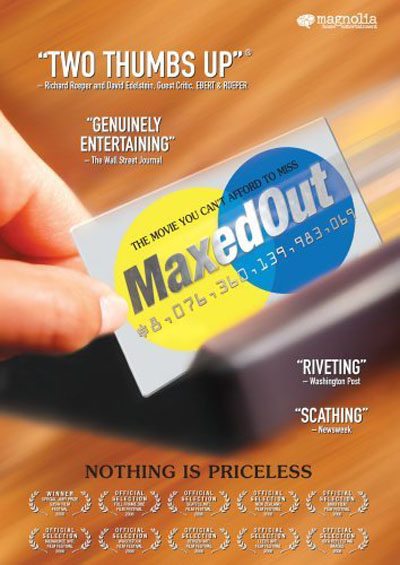
In 2006, director James Scurlock focused his attention on the credit card industry, and the result was Maxed Out: Hard Times, Easy Credit and the Era of Predatory Lenders. To draw attention to the abusive practices of the banks and how they are affecting our society, Scurlock interviews debtors, creditors, and financial experts. His contention is that banks deliberately lure people likely to have trouble repaying loans into financial traps with no IVA Advice at all, and that this is made possible by apathetic lawmakers, government connections, and the debt collection industry. Maxed Out received the Special Jury Prize at the South by Southwest Film Festival in 2006.
9. Outfoxed: Rupert Murdoch’s War on Journalism
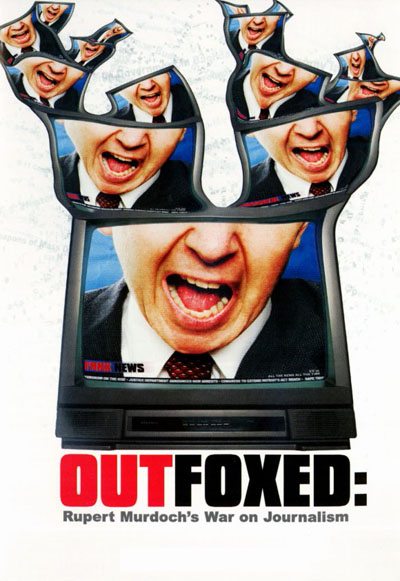
In the 2004 documentary, Outfoxed: Rupert Murdoch’s War on Journalism, filmmaker Robert Greenwald claimed the purpose of the Fox News Channel was to promote the right-wing views of the network’s owner, Rupert Murdoch. Backing up his charge with interviews with former Fox News employees and contributors, Greenwald also examines Murdoch’s vast media empire and the consequences of one person controlling so much of the world’s information resources. The film was generally praised by critics, although some noted the filmmaker’s approach seemed partisan at times. The San Jose Mercury News’ Bruce Newman wrote that “while Outfoxed surely will appeal more to liberals than to conservatives, its value to its self-selected audience lies not in upending anyone’s expectations, but in taking the uninitiated down the Fox News rabbit hole.”
8. Super Size Me
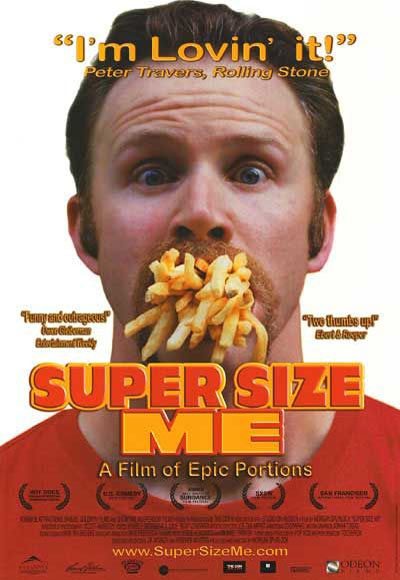
Few documentaries have had the same cultural impact as Super Size Me, the 2004 film directed by Morgan Spurlock. In an effort to examine the fast food industry and its responsibility for the nation’s obesity epidemic, Spurlock documented a 30-day period during which he only ate food from McDonald’s, the world’s largest hamburger fast food chain. He used the changes in his physical – Spurlock gained over 24 pounds – and psychological health to explore how the fast food industry promotes poor nutrition in order to make money. Nominated for the Best Documentary Feature at the Academy Awards, Super Size Me spawned parodies, television shows, books, and even a comic book featuring stories about fast food scares. Critics generally viewed the film as flawed but important. Eleanor Ringel Gillespie at the Atlanta Journal-Constitution wrote the film was “frivolous and slightly smug, but it certainly puts the question of America’s health squarely on the table… in a wonderfully entertaining way.”
7. Wal-Mart: The High Cost of Low Price
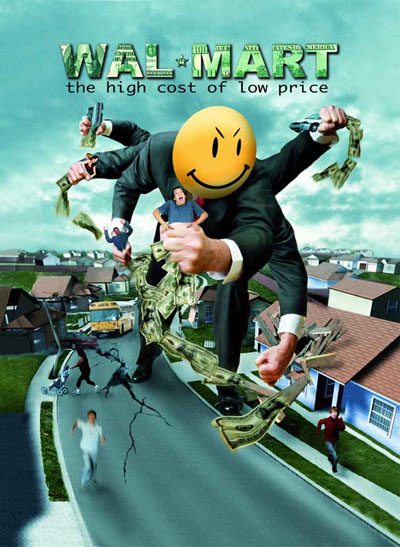
If asked to name a horrible business, many people might mention Wal-Mart. In his 2005 film, Wal-Mart: The High Cost of Low Price, director Robert Greenwald sheds light on the company’s questionable business practices. Wal-Mart’s policies concerning unions, workers’ rights, and the environment, as well as their impact on small businesses, are examined through interviews with small business owners and former employees and video footage of Wal-Mart executives. While the company has claimed that the film is factually inaccurate, Wal-Mart established a public relations war room to respond to public criticism shortly after the film’s release. The documentary was well received by critics, one of which was Ty Burr at The Boston Globe who said the film was “advocacy journalism at its most unsparing, and it demands to be seen, discussed, argued with, and acted upon.”
6. Sicko
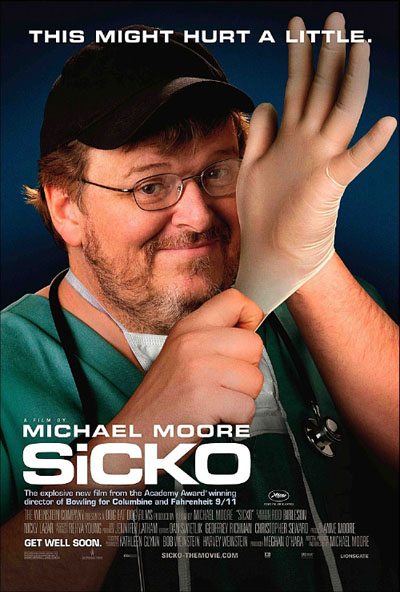
After the successes of his documentaries Bowling for Columbine and Fahrenheit 9/11, director Michael Moore turned his sites on the American healthcare industry. His 2007 film, Sicko, is a wholesale condemnation of the health insurance and pharmaceutical industries in which he finds U.S. healthcare lacking when compared to the governmentun systems in Cuba, Canada, France, and the United Kingdom. Nominated for the Academy Award for Best Documentary Feature, Sicko was a box-office hit and received widespread acclaim. Fox News’ Roger Friedman praised the film for letting “very articulate average Americans tell their personal horror stories at the hands of insurance companies.”
5. The Queen of Versailles
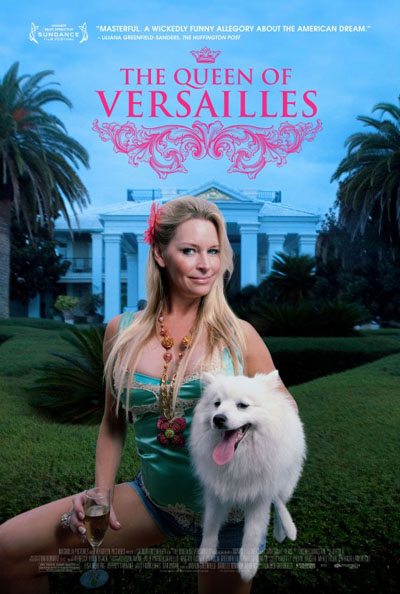
The 2012 documentary The Queen of Versailles, directed by Lauren Greenfield, recounts the story of David and Jaqueline Siegel. These wealthy owners of the Westgate Resorts time-share business try to build the country’s most expensive single-family house, inspired by the French palace at Versailles, just as the 2008 recession hits, fueled by the sub-prime mortgage disaster. The film follows the members of the Siegel family as they start to realize their fortune and lifestyle may not be permanent. The winner of several major film awards, including the U.S. Directing Award at the 2012 Sundance Film Festival and a nomination for Best Documentary Film by the International Documentary Association the same year, The Queen of Versailles received strong critical approval. Notably, Ezra Klein, blogger and columnist at The Washington Post, wrote that the documentary was “perhaps the single best film on the Great Recession.”
4. Food, Inc.
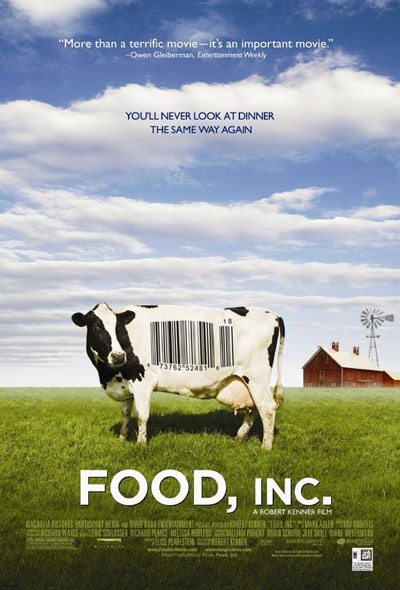
Food, Inc., the 2008 documentary directed by Robert Kenner, slams the American corporate agriculture industry claiming that agribusiness not only produces unhealthy food, but also abuses animals, mistreats its employees and destroys the environment in the name of profitability. Critically, the film received high marks with The San Francisco Chronicle suggesting that the film “…throws out one zinger after another, making its case with the methodical and unremitting force of muckrakers trying to radicalize — or at least rouse — a dozing populace.” Some reviewers noted that the lack of participation from companies criticized in the film gave it an unbalanced feel.
3. Enron: The Smartest Guys in the Room
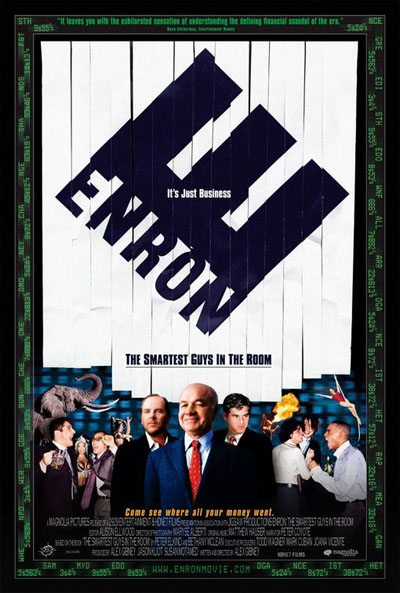
When the energy company Enron Corporation went belly-up in 2001, few people understood the extent of the corruption involved. Enron: The Smartest Guys in the Room, the 2005 documentary based on the book written by financial reporters Bethany McLean and Peter Elkind, examines the scandal that shook the business world and the economy. Director Alex Gibney tracks the company’s collapse and the criminal trials that followed while interviewing reporters and stock analysts, as well as former Enron executives and employees. After receiving critical acclaim, the film was nominated for the Academy Award for Best Documentary Feature and won Best Documentary Feature at the Independent Spirit Awards.
2. China Blue
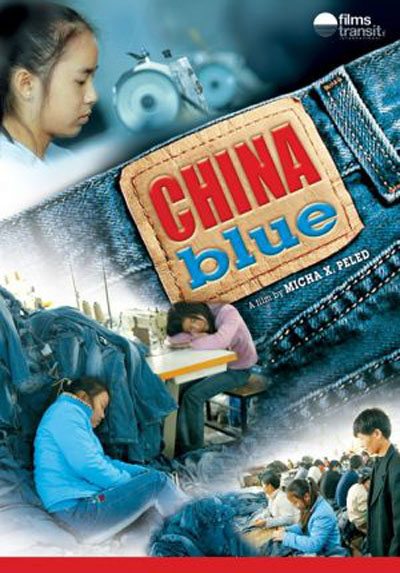
Micha Peled directed this 2005 documentary that exposes sweatshop conditions in China’s factories by following one 17-year-old worker named Jasmine Li. The film follows the young girl as she helps to manufacture blue jeans for a company in Turkey while enduring inhumane conditions and making only half a yuan (about six U.S. cents) per hour. Critics’ praise of the film was nearly unanimous with Beverly Berning of culturevulture.net writing “China Blue does not offer solutions, but it might help get us to stop ignoring the problems” and calling the documentary “the little elephant that roared.” China Blue was awarded the Amnesty International-DOEN Award at the 2005 Amnesty International Human Rights Film Festival.
1. Roger & Me

Filmmaker Michael Moore is well-known for many high-profile documentaries, but 1989’s Roger & Me was the first. Taking a personal approach by using his family’s story and his hometown of Flint, Michigan, Moore examines the decision by General Motors CEO Roger Smith to close several auto plants in the blue-collar city. The resulting loss of 30,000 jobs to Mexico devastated the local Flint economy and spurred on Moore to find the elusive CEO for an interview. Moore’s sometimes comical mission becomes the foundation of his expose. While some critics, including Pauline Kael of The New Yorker, questioned the chronology of the film, most reviewers were impressed. Reviewer Emanuel Levy called the movie “scathingly biting satire of Reagonomics” and John A. Nesbit of Old School Reviews wrote the film provides some “sharp political muckraking.”
